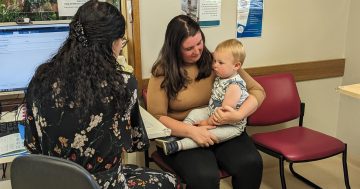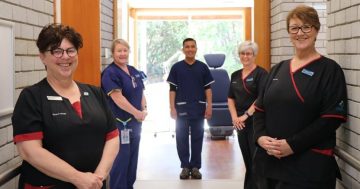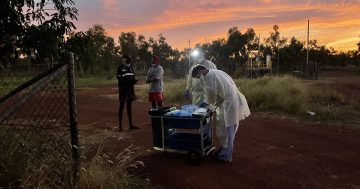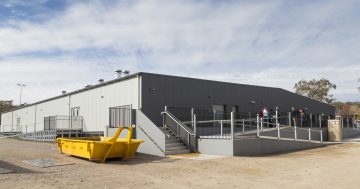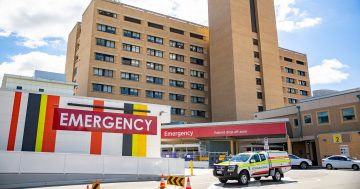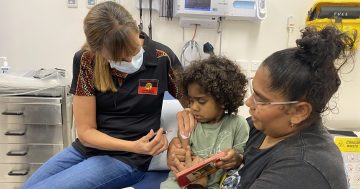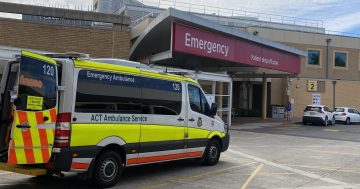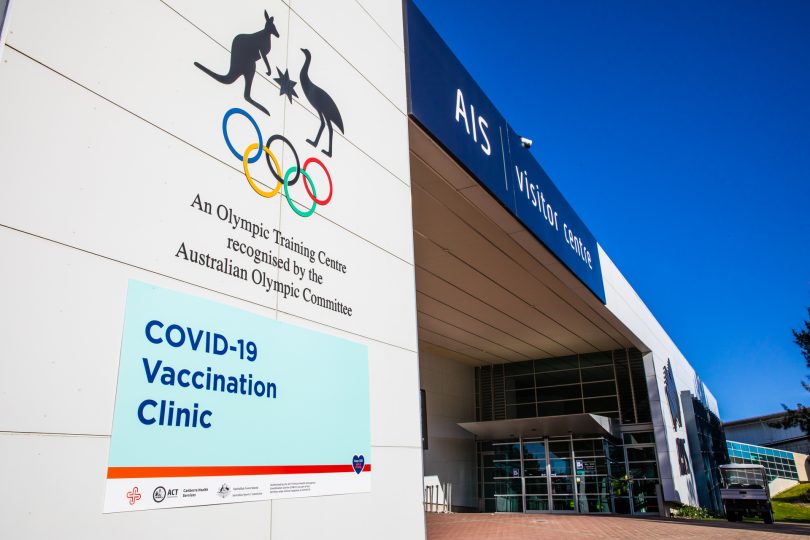
Appointments for children are available at the AIS Arena COVID-19 Vaccination Clinic and even a single dose of the vaccine gives some protection. Photo: Michelle Kroll.
COVID-19 is now circulating widely in our community, so it’s not surprising that families are worried about what happens if their children contract the disease.
Most children have only mild symptoms, such as a runny nose and fever, and recover within a couple of days. Others have no symptoms at all.
Very few children experience severe illness requiring medical intervention or hospitalisation. Most of the children we’ve seen as COVID-19 inpatients at the Centenary Hospital for Women and Children received care because they were dehydrated or while their parents were ill with COVID-19.
Kids can get a bit fussy when they feel unwell and avoid eating and drinking. It’s critical that you keep their fluids up when they are unwell.
Preparing your family for COVID-19
Having a COVID-19 positive family member means being isolated at home for a few days. You may like to make some arrangements so that you are well prepared.
Pre-cook and freeze some simple meals and stock up on children’s Panadol or Nurofen, or their equivalent. Check you have a thermometer to monitor fevers. Buy some fruit juice and icy poles to help with hydration, including Hydralyte (or similar) ice blocks.
Let other family members, friends or neighbours know you can help if they need support with pharmacy or grocery deliveries in the coming weeks, and ask whether they’re happy to do the same for you.
Take a moment to talk to your child about the current COVID-19 situation and to listen to their worries and thoughts about it all. This will help to ensure they feel safe and supported at this time. Knowing they can trust you and rely on you will help.
Preventing illness
In Canberra, we’re lucky that our children are often better about hand hygiene and covering their coughs and sneezes with their elbows than adults.
However, given the likelihood of COVID-19 exposure, families should take extra steps to minimise transmission.
The most important of these is getting vaccinated. Vaccination provides excellent protection against serious illness from COVID-19 in children and helps keep your family safe and well. Even a single dose of the vaccine gives some protection.
Appointments for children are available at the AIS Arena COVID-19 Vaccination Clinic (call 5124 7700) or selected GPs and pharmacies (use the Australian Government’s Vaccine Clinic Finder).
Please encourage children to wash their hands regularly, wear masks inside when they can’t socially distance, and play together outside or in well ventilated indoor spaces where possible.
Children with some underlying medical conditions, such as asthma or diabetes, may be more likely to get quite sick. In these cases, parents may wish to speak to their GP for further advice.
If your child has COVID-19
In most cases, the usual household carers of a child with COVID-19 can care for them safely at home, encouraging the child to rest and stay hydrated and offering medication like children’s Panadol or Nurofen for pain relief or mild fever if needed.
Dress them in appropriate clothing so they are comfortable – not sweating or shivering – and encourage them to rest.
Talk to them. Your child may be anxious about having COVID-19. Take some time to talk to them about what they can expect. When you do discuss it, be open and honest so they feel safe and supported. Perhaps reflect on past experiences with an illness that they handled well, and let them express their feelings about the current situation to you.
When to seek medical help
Signs you may need to seek medical advice are a persistent fever that is not responding to treatment, breathlessness, reduced fluid intake, vomiting or diarrhoea.
In these cases, you can contact the COVID Care@Home team on 5124 3085, make an appointment for a telehealth appointment with your GP, call Health Direct on 1800 022 222 or, for those over the age of two, take them to the new COVID-19 Walk-in Clinic at Garran.
The Garran clinic provides COVID-19 positive patients with support, advice and interventions in relation to COVID, as well as treatment of non-life-threatening injuries or illnesses such as cuts and abrasions, strains and sprains, bites and stings, infections and wounds.
It’s open every day from 7:30 am to 10 pm and no appointment is necessary.
If you are concerned your child is seriously unwell, has difficulty breathing, is severely dehydrated or fainting, please call Triple Zero (000) immediately and inform the operator that your child has COVID-19.
What about ‘long COVID’?
We have seen very little ‘long COVID’ in children in the ACT to date, but your child may experience ongoing symptoms like fatigue, headaches, difficulty thinking clearly or a persistent cough. If this occurs, please talk to your GP.
Families are facing a hectic few weeks ahead while navigating this next stage of the Omicron wave. The team at COVID Care@Home and the Centenary Hospital are ready to support you, and thank you in advance for your understanding during a busy time for our health service.
Paediatrician Dr Blessy Charles is the Unit Lead in the Department of Paediatrics at Canberra Health Services. She has worked as part of the COVID Care@Home team along with her colleagues since its inception in August 2021.
More information about COVID-19 and children is available on the ACT Government’s COVID-19 website or the Sydney Children’s Hospital’s Network website.












